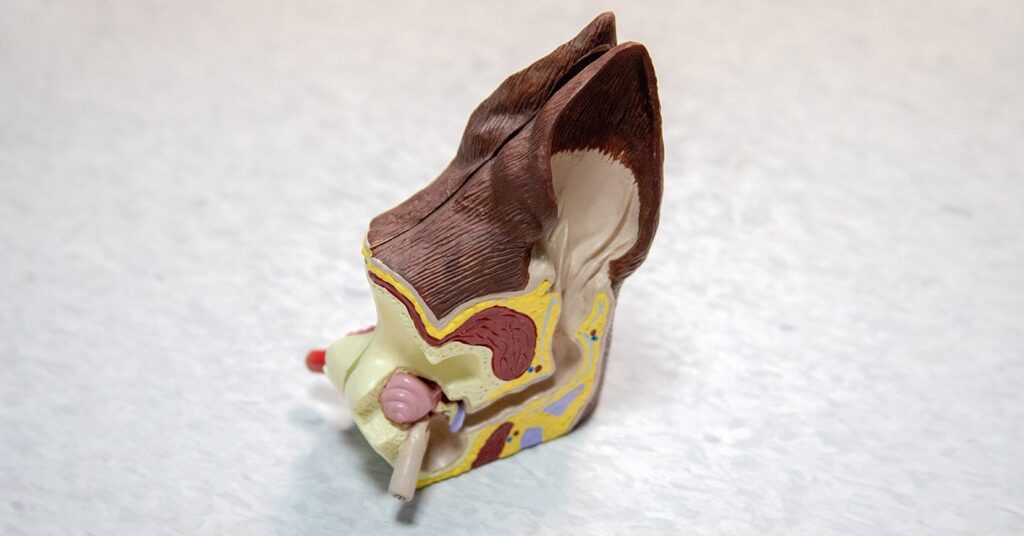Dog Ear Infections: Symptoms, Causes, Treatment & Prevention

As a small animal veterinarian, I often diagnose and treat ear infections in pets. Ear infections are a common ailment, especially in dogs. They are an extremely uncomfortable, itchy, and even downright painful disease in pets. And the longer an ear infection is left untreated, the worse the infection may become.
So let’s discuss the common signs of a dog’s ear infection, causes of ear infections in pets, and ways we can treat and prevent these common issues.
Develops your Dog's "Hidden Intelligence" To eliminate bad behavior and Create the obedient, well-behaved pet of your dreams…READ MORE
What is an ear infection in dogs?

Your pet’s ear anatomy is made up of the ear flap (external pinna), the external or outer ear canal, the eardrum, the middle ear canal, and the inner ear canal.
The most common type of ear infection in pets is an infection of the outer ear canal (otitis externa).
What causes an ear infection in my pet?
The most common causes of a dog’s ear infections are:
- Bacterial infections
- Yeast Infections (Malassezia)
- Ear mites
- Foreign objects, polyps, or a tumor of the ear
How does my pet get an ear infection?
- Genetic Predisposition of the Breed – Some breeds of dogs, such as Cocker Spaniels and Miniature Poodles, are genetically predisposed to develop ear infections. The condition is likely due to the anatomy of the ear in certain breeds. Long, floppy ears that tend to hold in moisture or heat or excessive amounts of hair in the ear can be the perfect setting for a dog’s ear infection.
- Moisture – Warmth and moisture create a perfect environment for yeast or bacteria to live and flourish. It is not uncommon to diagnose a dog’s ear infection after they swim or receive a bath. After bathing your dog or allowing them to swim in a body of water, it is important to clean your pet’s ears with an ear cleaner that contains a drying agent to prevent an ear infection.
- Contraction from Other Pets – Although not as common in dogs, ear mites (an infectious agent) can be transmitted to other pets by contact. We see ear infections due to ear mites most commonly amongst puppies and cats.
- Allergies – Both environmental and food allergies can predispose pets to ear infections.
- Hypothyroidism – Low thyroid (T4) function may predispose pets to chronic ear infections.
What are the common signs of ear infections in dogs?
Ear infections can be very uncomfortable for your beloved pet. The most common signs you may see are:
- Itching and Pain – Head shaking and scratching at the ear is a huge indicator of itching and pain in the ear.
- Odor – You may smell a strong, unpleasant odor from your dog’s head and ear area.
- Red and Inflamed Ears – Infections can often cause swelling, redness, and heat on the surrounding tissue.
- Discharge – Often there is a discharge from the ear with an infection. The discharge can range from a crusty, black substance to yellow pustular discharge.
- Neurologic Deficits – In severe, chronic cases, pets may develop neurological disease that involves a head tilt or loss of balance.
Develops your Dog's "Hidden Intelligence" To eliminate bad behavior and Create the obedient, well-behaved pet of your dreams…READ MORE
How do you diagnose an ear infection in my pet?
If your pet is experiencing any clinical signs of an ear infection, it is important to have them evaluated by your veterinarian. Since ear infections can be caused by different infectious agents (bacteria, yeast, mites) or even a foreign body or tumor, it is imperative to narrow down the underlying cause of the infection quickly.
Your veterinarian will perform a thorough physical examination that involves evaluating the ear with an otoscope, an instrument that provides magnification and light. Using an otoscope, your veterinarian will assess how the ear canal appears, if there is any damage to the eardrum, or of there is any evidence of a tumor or foreign bodies. At times, your pet may be in too much pain for an examination. It may be necessary to sedate or anesthetize your pet to allow for a proper ear examination.
Your veterinarian will also perform an ear cytology, which involves taking a sample of the discharge from the ear canal and assessing the specimen under the microscope. Your veterinarian will be able to diagnose the type of infection (bacterial, yeast, or mites) and decide on the proper treatment.
In more severe, chronic cases, your veterinarian may recommend a culture to ensure your pet receives the proper treatment. Your veterinarian may recommend full bloodwork (CBC and chemistry panel) to rule out an underlying condition, such as hypothyroidism.
How do you treat dog ear infections?
Based on your veterinarian’s examination and diagnostic tests, they will prescribe the proper course of treatment for your pet’s ear infection. If a foreign body was found, it will be removed. If your pet was diagnosed with a bacterial, yeast, or mite infection, your veterinarian will prescribe a specific treatment for those agents.
Treatment generally involves a thorough flushing and cleaning of the ear with a medicated cleanser followed by medicated ear drops applied daily for a specific period of time. Your veterinarian will demonstrate how to properly clean your pet’s ears and apply the medication. Depending upon the type of ear infection and severity, your veterinarian may also prescribe a systemic antibiotic or steroid.
Some pets suffer with chronic ear infections secondary to allergies or low thyroid (hypothyroidism). So it is particularly imperative for your veterinarian to properly diagnose and treat your pet’s ear infection. Diagnosing an underlying condition is crucial to treating and preventing ear infections in pets.
What is the prognosis?
Once diagnosed properly, most ear infections will resolve with proper treatment and care. Generally, the prognosis is good when dealing with ear infections. If an underlying cause, such as hypothyroidism or allergies, has not been diagnosed properly and treated, ear infections may be more challenging to treat. Always seek out the care and advice of your veterinarian.
How can I prevent an ear infection in my pet?
- Once-weekly proper ear cleaning with a medicated ear cleaner may help to prevent ear infections. Always ask your veterinarian what the best ear medication is for your pet.
- Following a bath or swim, make sure to clean your pet’s ears out with a drying agent. Again, ask your veterinarian what ear cleaner is best for your pet.
- Treat any underlying diseases. If your pet suffers with allergies or hypothyroidism, it important to properly treat these conditions to prevent secondary ear infections.
Final thoughts on pet ear infections…
It is my ultimate goal to help educate pet parents on the ailments that may afflict their beloved fur babies, including ear infections and available treatment options. As a small animal vet, my number one goal is to make sure your pets are happy and healthy. If you ever have any questions or concerns about your pet, you should visit or call your veterinarian without hesitation. They are always your best resource to ensure the health and wellbeing of your pets!

